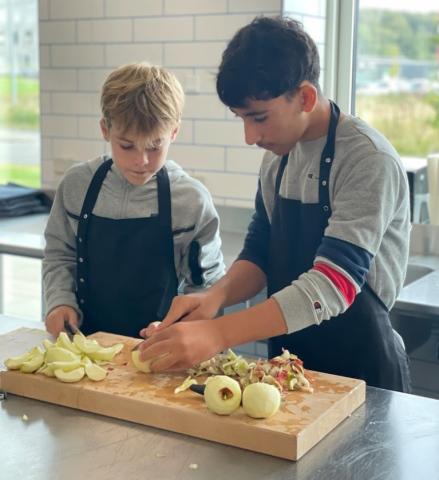UN’s International Day of Awareness of Food Loss and Waste
As part of the Interreg Europe project CIBUS, which aims to reduce food waste and loss across Europe, Culinary Institute by Vejle Erhverv hosted a foodwaste workshop for 6th grade students from Kirkebakkeskolen in Vejle. The event, held to mark the UN’s International Day of Awareness of Food Loss and Waste on September 29, focused on educating young people, the future consumers, about the importance of reducing food waste.
Culinary Institute by Vejle Erhverv collaborates with schools in Vejle as stakeholders within the CIBUS project. This partnership represents an important step toward fostering a more sustainable future. By engaging students in discussions on food waste and sustainability, the project aims to influence their consumption habits and equip them with the knowledge and tools to make informed, responsible choices.
A significant part of the workshop was dedicated to discussing what young people typically throw away and why it can be difficult to use all the food they have. The students shared their own experiences on how they handle food waste at home and discussed why they sometimes consider food to be "too old" to eat, even when it might still be usable. This dialogue helped students gain insight into their consumption patterns and how they can better prevent food waste.
One of the core values at Culinary Institute is the focus on taste and gastronomic sensory science. Taste is not just about enjoyment but also plays a crucial role in understanding and utilizing food efficiently. During the workshop, students were introduced to the five basic tastes—salt, sour, sweet, bitter, and umami—and learned how to use these tastes to create balanced, flavorful dishes using surplus ingredients. This sensory approach helped students see how focusing on taste can reduce food waste while still creating exciting culinary experiences.
The students prepared two creative food waste dishes: small focaccia breads with surplus vegetables and an apple cake made with “old bread” and windfall apples. Both dishes demonstrated how kitchen leftovers can be transformed into delicious meals, reducing food waste and making better use of ingredients.
The CIBUS project is committed to promoting a circular economy and reducing food waste in the food sector. By working with local schools in Vejle, the project seeks to raise awareness of the consequences of food waste and equip young people with the skills needed to contribute to a more sustainable future.


